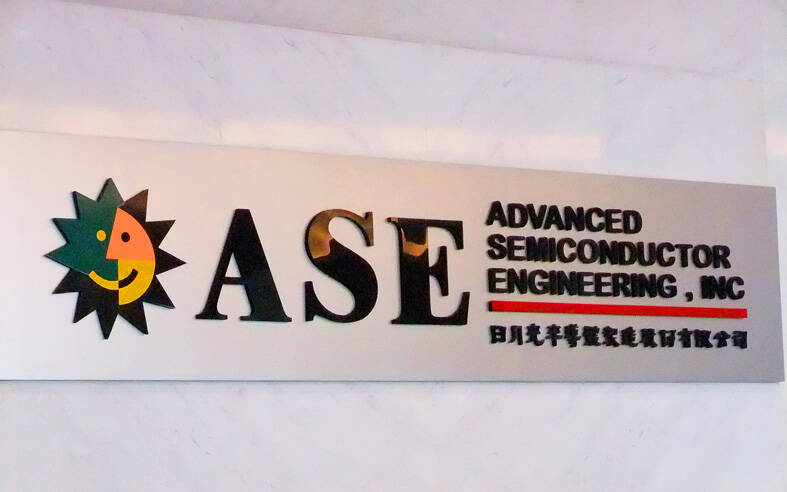A high-end integrated circuit packaging and testing plant in Kaohsiung owned by Advanced Semiconductor Engineering Inc (ASE, 日月光半導體), a subsidiary of ASE Technology Holding Co (日月光投控), has been selected as a “lighthouse factory” by the World Economic Forum (WEF).
The term “lighthouse factories” refers to production plants that have adopted fourth industrial revolution (4IR) technologies, including artificial intelligence (AI) and the Internet of Things in their daily operations.
The Kaohsiung bumping plant had been included by the WEF in the organization’s Global Lighthouse Network, a community of manufacturing sites and value chains that are leaders in the adoption of 4IR technologies, ASE said in a statement on Saturday.

Photo: CNA
“Bumping” refers to a process in semiconductor manufacturing where bumps are formed on wafers before they are diced into individual chips.
By adopting AI-enabled processes, the Kaohsiung plant’s production has risen by 67 percent, while the order lead time has been cut by 39 percent, ASE said.
The Kaohsiung factory is one of 18 lighthouse network sites announced by the WEF on Friday, joining the ranks of 132 leading manufacturers in the world, it said.
The increasing complexity of chip manufacturing processes amid disruptions in supply and demand had created unprecedented challenges for the Kaohsiung bumping factory, the company said.
Given that there are 100 more process steps in bumping operations than in traditional integrated circuit packaging operations, ASE strategically planned and deployed 4IR technologies across its operations to streamline manufacturing and optimize production, it said.
“By integrating 4IR technologies into their operations, lighthouse companies are achieving double-digit impact on throughput, costs and lead times,” Francisco Betti, head of the WEF’s Shaping the Future of Advanced Manufacturing and Value Chains, said in the statement.
“In this next chapter of the Fourth Industrial Revolution, they are setting the pace across industries. Lighthouses are demonstrating how to scale advanced technologies across entire manufacturing networks and beyond toward suppliers and customers or new functions, such as procurement, logistics, and research and development,” Betti said.
ASE is the largest integrated circuit packaging and testing services provider in the world.
In addition to Advanced Semiconductor Engineering, the holding company also owns Siliconware Precision Industries Co (矽品精密), which it acquired in 2016.
ASE provides packaging and system-in-package services in the 5G, automotive electronics and high-performance computing industries, it said.

South Korea’s equity benchmark yesterday crossed a new milestone just a month after surpassing the once-unthinkable 5,000 mark as surging global memory demand powers the country’s biggest chipmakers. The KOSPI advanced as much as 2.6 percent to a record 6,123, with Samsung Electronics Co and SK Hynix Inc each gaining more than 2 percent. With the benchmark now up 45 percent this year, South Korea’s stock market capitalization has also moved past France’s, following last month’s overtaking of Germany’s. Long overlooked by foreign funds, despite being undervalued, South Korean stocks have now emerged as clear winners in the global market. The so-called “artificial intelligence

NEW IDENTITY: Known for its software, India has expanded into hardware, with its semiconductor industry growing from US$38bn in 2023 to US$45bn to US$50bn India on Saturday inaugurated its first semiconductor assembly and test facility, a milestone in the government’s push to reduce dependence on foreign chipmakers and stake a claim in a sector dominated by China. Indian Prime Minister Narendra Modi opened US firm Micron Technology Inc’s semiconductor assembly, test and packaging unit in his home state of Gujarat, hailing the “dawn of a new era” for India’s technology ambitions. “When young Indians look back in the future, they will see this decade as the turning point in our tech future,” Modi told the event, which was broadcast on his YouTube channel. The plant would convert

‘SEISMIC SHIFT’: The researcher forecast there would be about 1.1 billion mobile shipments this year, down from 1.26 billion the prior year and erasing years of gains The global smartphone market is expected to contract 12.9 percent this year due to the unprecedented memorychip shortage, marking “a crisis like no other,” researcher International Data Corp (IDC) said. The new forecast, a dramatic revision down from earlier estimates, gives the latest accounting of the ongoing memory crunch that is affecting every corner of the electronics industry. The demand for advanced memory to power artificial intelligence (AI) tasks has drained global supply until well into next year and jeopardizes the business model of many smartphone makers. IDC forecast about 1.1 billion mobile shipments this year, down from 1.26 billion the prior

People stand in a Pokemon store in Tokyo on Thursday. One of the world highest-grossing franchises is celebrated its 30th anniversary yesterday.